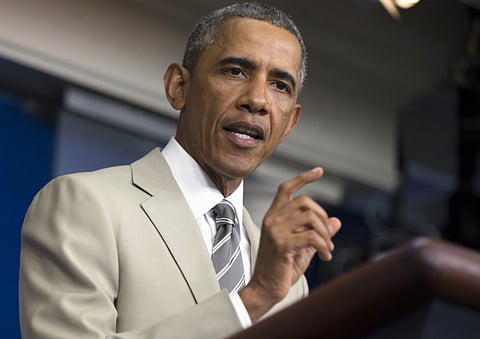Paradox of an American predicament
The US has the appetite to be a superpower, but the problem is that it has no stomach for what that actually entails

In 2006, George Bush Jr was caught at a G8 dinner in St Petersburg on an open mic, laying out his plan to halt the strife in Lebanon: “See the irony is that what they need to do is get Syria to get Hezbollah to stop doing this s*** and it’s over,” he told Tony Blair. It was high time, Bush thought, for the then United Nations secretary-general, Kofi Annan, to get on the phone with the Syrian President, Bashar Al Assad, and “make something happen”.
With a few notable exceptions, the performance of US foreign policy, both in public and private, has long been an unsubtle blend of carrots, sticks and presidential swagger. Impulse and ultimatum are privileged over reflection and negotiation.
In a summer that has seen their countrymen publicly beheaded and passenger planes shot out of the sky by rebels as war raged in Gaza, Ukraine, Iraq and Syria, Americans look to their commander-in-chief and expect him to “make something happen”.
Obama’s apparent inability to make anything happen on the international stage is unnerving many. Asked 10 days ago what his plans were for dealing with Islamic militants rampaging through Syria and Iraq, he said: “We don’t have a strategy yet.”
As he left the Nato summit in Newport last week, he announced a nine-nation coalition that would “push them back”, “systemically degrade their capabilities”, “narrow their scope of action” and “take out their leadership”. To some it sounded less like a battle plan to assert American power than a PowerPoint demonstration illustrating his pusillanimity.
Obama’s foreign policy approval ratings, once one of his strengths, are now pitifully low. According to Pew research, more than half believe he is insufficiently “tough”.
His reputation for “weakness” is ironic given the number of people Obama has assassinated with drones. The day he heard he had killed an American-Yemeni radical Islamist in a drone attack in Yemen, he told his aides: “Turns out I’m really good at killing people. Didn’t know that was gonna be a strong suit of mine.”
The public actually supports most of what he has done. Polls show that a majority back air strikes against Islamic State of Iraq and the Levant, troop withdrawal from Iraq and the use of drones to kill “suspected terrorists” abroad while overwhelmingly preferring sanctions over military action against Russia. Many believe he is removing troops from Afghanistan at the right pace. But a president is more than the sum of his policies.
The disappointment has two strands. The first is that none of it adds up to a strategy. There is no grand narrative suggesting a higher ideal or a clear conclusion. It is triage. Some have slammed him for simply reacting to events. As a criticism, it is both true and trite. It denies the complexity of international affairs and overstates the US’s capacity to shape them. America cannot control the situation in Ukraine and has precious little sway among Islamic militants.
The second is that while the public backs these policies they do not believe they will work. Most believe sanctions against Russia will be ineffective and think that even though the war in Afghanistan has contributed to the long-term security of the US, it was not worth fighting. In Iraq, they blame both the US invasion and the withdrawal of troops for the deteriorating situation there.
The very ambivalence evident in those polls reveals the paradox of how America feels about its place in the world. It still has the appetite to be the world’s only superpower; but it does not have the stomach for what that entails. It wants to project power without risk and bend the world to its will without force.
For all the criticisms from the right, this is a direct result of the military debacles in Iraq and Afghanistan and the deep recession that accompanied them. Their sole foreign policy was military force. But there was no military solution and no plan B, leaving support for further interventions morally discredited abroad and politically and economically depleted at home.
“We’re not trying to preside over America’s decline,” national security adviser Ben Rhodes told James Mann in The Obamians. “What we’re trying to do is to get America another 50 years as leader.” They want to “make something” happen. They just don’t know what and don’t know how.
— Guardian News & Media Ltd



